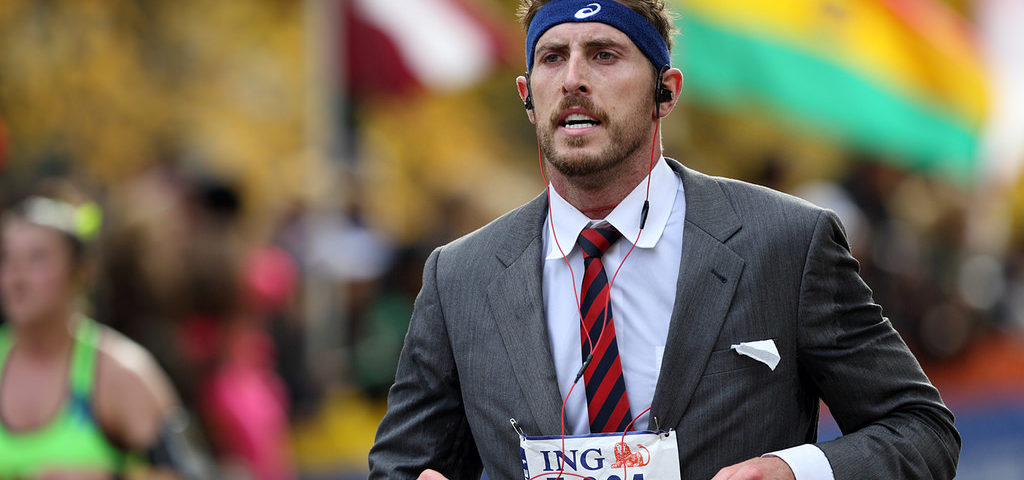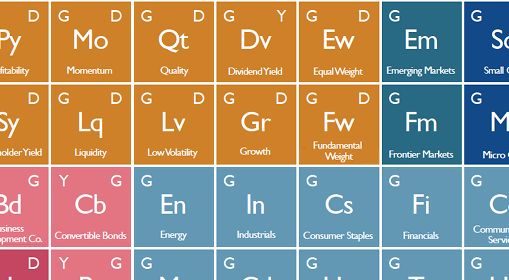Running the D.C. Marathon last March was supposed to be a glorious experience: cherry blossom week, the first day of spring, sunshine and smiles. Instead, we were greeted by ice, slush, and 12 degree wind-chill — a shocking contrast to my usual running experience in Phoenix’s 103-degree desert sun.
From the sidelines, marathoning must look pretty simple: just move your legs for a couple of hours and until you reach the finish line. But for the runners, marathoning is a multifaceted experience — exhilarating, emotional and exhausting. It’s also cerebral, strategic, and rewarding in so many ways beyond the race.
In any weather, marathoning take several hours. It is a unique form of meditation. I reflected on the decades I’ve spent as an entrepreneur, and what it’s like to build more than a half dozen high-tech ventures.
The startup experience looks much different when in the race and not on the sidelines. The entrepreneurial journey can be a grueling and intense roller coaster — just like a marathon — with many profound and insightful lessons:
1. Entrepreneurship is a Marathon not a Sprint
Yeah, it’s a tired cliche. But this phrase means more than “it will take a lot of time.” Marathoning, like entrepreneurship, is less about speed as it is about perseverance. Both require stamina, persistence, tolerance for pain and tolerance for those unexpected twists and turns.
Sprints are bursts of energy that surge you ahead of a handful of competitors. Marathons are more complex affairs, with thousands of participants but very few direct competitors. For most, marathons are about surviving the race, finishing the race, and achieving a personal-best.
Success is not about having unlimited energy, but in managing your energy. Failure comes because you ran out of steam and couldn’t continue with the race. In entrepreneurship, failure usually comes from running out of resources — usually cash. And success isn’t about having unlimited resources, but in managing your limited resources. It’s knowing when to conserve, and when to unleash your resources at the right time.
Success is more likely if you have done it before, know how to handle the landmines ahead.
2. Experience Counts
At the first moments of the race, everyone is fast and feels good — particularly younger runners. They look so energetic as they bolt out of the starting-gate. They have energy, but lack experience, and treat the marathon (and their startup) like a series of sprints.
Inexperienced entrepreneurs crank out rapid iterations of “minimum viable products“ and “move fast and break things”, without realizing that they are wasting valuable time, energy and resources.
Experience counts. Experience saves time and energy. The experienced have run this kind of race before. They have perspective on the bigger picture; they know how to pace themselves, manage their energy and preempt problems.
Another cliche is the 20-something founder: bright, energetic and fast. You might think the same thing about marathoners. But here’s some food for thought:
- Half of marathon finishers fall into the 40 or older category. [1, 2]
- The average age of Boston marathon runners is about 45 for men and 40 for women. [3]
- The fastest age group that runs a marathon is 40–44 years old. [4]
Bet you didn’t see that coming.
It’s the same for entrepreneurs:
- An MIT study found that the average age of startup founders is around 42 years old. [5]
- The average age of entrepreneurs who founded high-growth companies is 45 years old. [5]
- And the average age of Silicon Valley entrepreneurs who have a successful exit (finishes the race) is 47 years old. [6]
Experience is not just about being older, it’s about having done it before — and having a strategy for doing it better.
3. Strategy is as Important as Speed
Strategy means being able to look at the bigger picture, anticipating when you need to take risks, and when you need to be careful.
Strategy means knowing the race, and knowing the difference between running a 5k, 10k, half marathon or full marathon.
Strategy knows how to manage the terrain: Even a small hill can seem insurmountable and drain your energy. The experienced runner knows how to manage the hills and the potholes; they know how anticipate thirst, fatigue and porta-potty breaks.
In entrepreneurship, strategy is the difference between coding a one-hit-wonder iPhone app, and building a sustainable company. It’s the difference between emailing a hundred customer surveys, and truly knowing the market and the industry.
Strategy is the difference between “seeking funding” and “attracting funding.” It’s the difference between success and failure.
For “the long game” strategy trumps brute-force energy and speed every time.
4. Ignore (almost) Everyone
It wouldn’t be a marathon without fans cheering from the sidelines, waving signs and rallying you forward. But just because people are cheering, doesn’t mean you’re the champion.
Adulation from the crowd can feel good, but in the end it’s irrelevant. All that matters is your pace and crossing the finish line. If other runners get cheers, it does not mean they are faster or better than you. If you get cheers, it doesn’t mean you are a better runner, and doesn’t mean you will be successful.
Too many entrepreneurs believe that cheers from the crowd — “good press”, winning contests, or lots of upvotes on Product Hunt — equals success.
Some people cheer at everyone, so it’s no measure of how well you are doing. And some runners (or entrepreneurs) are great at stoking the crowd and eliciting cheers: it doesn’t mean they are in the lead.
Many marathoners (and entrepreneurs) get distracted. They look at others in the race and think:
- “Why are they ahead than me? I’m in better shape.”
- “Where did those other runners come from? I never noticed them before.”
- ”I hate those people ahead of me — they make it look so easy and effortless!”
Obsessing about the others in the race will only slow you down. Ignore the competition: They are focused so much on their own performance that they probably don’t even know you exist.
5. Mental Conditioning is as Important as Physical Conditioning
One thing is for sure: there will be pain — whether you’re running a marathon or a startup.
If you ignore the pain, or ignore the possibility of pain, then it will affect you during the race. Instead, embrace the pain.
Embrace the pain means: expect pain; manage the pain; and know the difference between good pain, bad pain — and which pain is temporary, and which pain is a warning — where you need to stop and change tactics.
No matter how physically conditioned you are, you will experience pain and fatigue. It can exhaust you or it can embolden you. The difference is in mental conditioning. Every marathoner (and entrepreneur) goes through bouts of despair, boredom, self-doubt, and self-talk:
- “I don’t know if I can finish this. “
- “Why did I even start this ..?”
- “How foolish I was to think I was prepared!
- “What have I gotten myself into?”
- “Oh God, please make it stop …”
- “What, is that a hill? No one said anything about hills!”
- “When is this going to end?”
- “I don’t know if i have the energy to continue”
As Yogi Berra said: “Ninety percent of the game is half mental.”
Champions manage their mind above all. They resist the urge to quit — particularly when the terrain gets rocky, when the race gets tedious, or when the unexpected hill seems insurmountable.
You can’t just quit in the middle of a marathon: you still have to walk several miles to get back (and there are usually no taxis waiting on the sidelines).
Most entrepreneurs are in a position where they can’t just suddenly quit and find a job. You can’t just suddenly walk away from customers, investors, employees or partners — and usually there is no job waiting.
Like marathoners, entrepreneurs know that it’s often harder to quit than it is to finish.
The Finish Line
There it is. With one last rush of adrenaline, I cross the finish line. There’s nothing quite like being able to say “Mission accomplished.”
Sure. It was grueling, messy, and painful. But a few days later the pain is a distant memory. I thought I knew how to run a marathon before, but I learned even more this time. I know I can do better. I scroll through the schedule, and I ask “when is the next marathon?”
If you’re an entrepreneur — particularly a veteran entrepreneur — you know all about marathon entrepreneurship: You’ve got bruises, injuries and battle scars, but you survived. You’re smarter and in better shape. You’re better with experience. After some rest you’re finding yourself a little restless, and asking “when can I start my next venture?”







